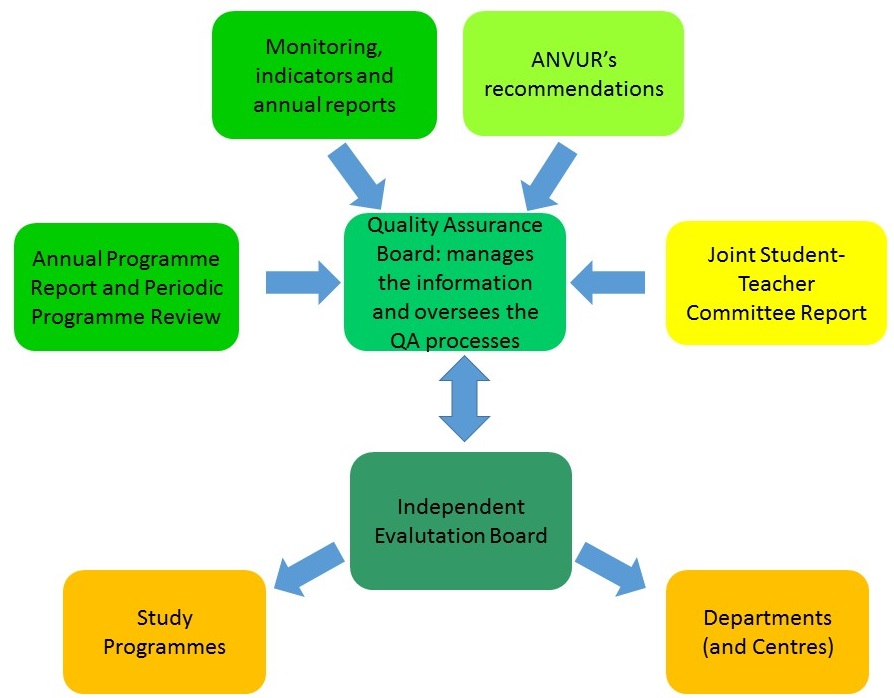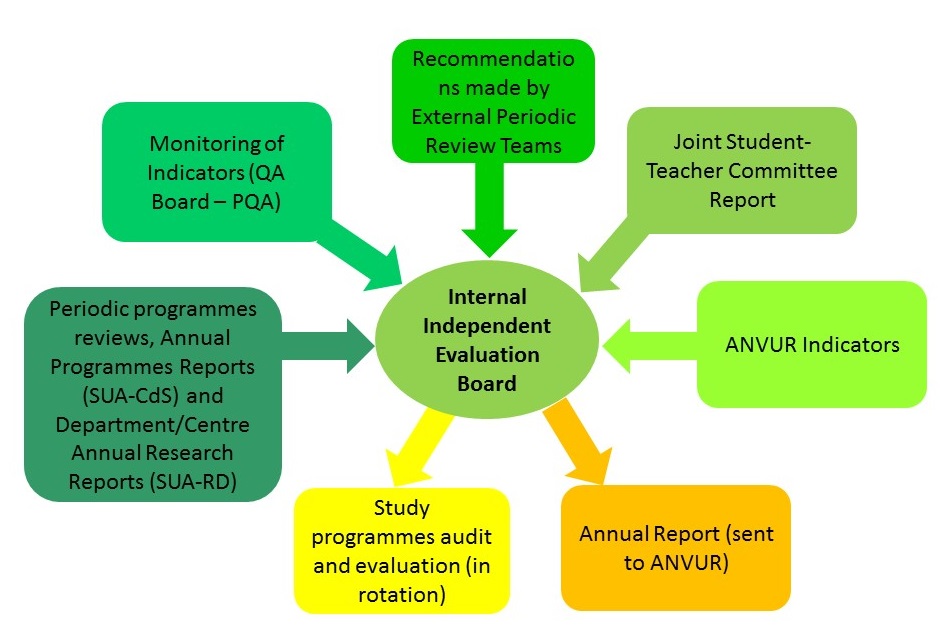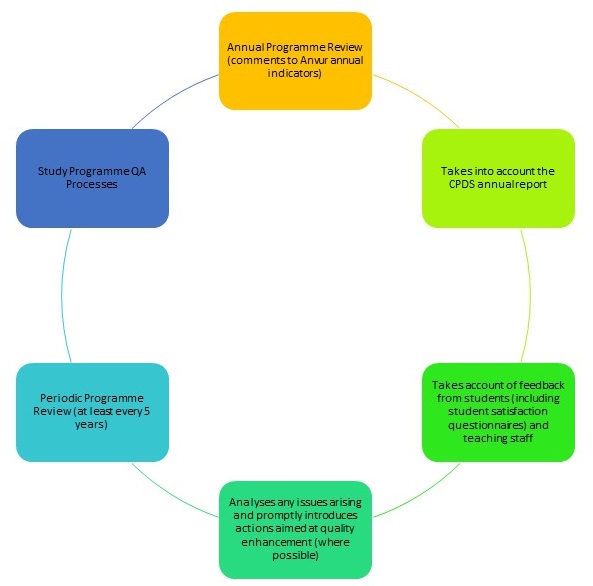Governing Bodies
The University’s governing bodies evaluate the documents produced by the QA Board (PQA), the Joint Student-Teacher Committees (CPDS) and the Independent Evaluation Board (NdV) in order to verify whether the University’s strategic mission is being followed and to take any necessary actions when outcomes differ from those expected.
Quality Assurance Board
The University of Trento Quality Assurance Board (PQA), in accordance with the indications given by the University governing bodies, ensures the efficacy and uniformity of the quality assurance (QA) processes.

Members
- prof. Enrico Zaninotto (president)
- prof.ssa Claudia Bonfiglioli (member)
- prof.ssa Emanuela Bozzini (member)
- prof. Loris Gaio (member)
- prof. Massimo Pizzato (member)
- prof.ssa Catherine Riley (member)
- prof. Giovanni Straffelini (member)
- Carlotta Chiaramonte (member)
- dott.ssa Vanessa Ravagni (member)
- dott.ssa Monica Sosi (member)
- dott. Paolo Zanei (member)
Role and duties
The PQA has a pivotal role in both the quality assurance and enhancement of the University through:
- fostering a quality culture which promotes continuous enhancement of all the University’s activities, overseeing and monitoring the QA processes across the University;
- advising the University’s governing bodies on matters regarding QA, such as drafting and /or updating the University’s QA Policy and identifying effective and efficient processes for the QA of Teaching and Learning and of Research;
- drafting and updating the tools (such as Guide lines and training sessions) which enable those engaged in QA to effectively carry out QA processes;
- defining and updating the organisation and timing of the QA processes of both Teaching and Learning and Research and Third Mission;
- providing constant, efficient oversight and monitoring of QA processes according to the activities programmed for that year;
- supporting the Departments/Centres and individual study programmes in the general QA processes in order to develop a functional QA framework for the University;
- coordinating the smooth flow of information and documentation regarding QA, in particular to and from the University’s governing bodies, the Independent Evaluation Board (NdV), the Joint Student-Teacher Committees (CPDS), the Departments/Centres and the Study Programmes.
The Quality Assurance Board (PQA) drafts an annual report on the year’s activities, initiatives and outcomes which is sent to the Academic Senate and the Independent Evaluation Board (NdV).
Independent Evalutation Board
Il The University of Trento’s Independent Evaluation Board (NdV) is composed of five highly qualified members (at least two of which are expert higher education evaluators) and the majority are external members. They hold office for four years and can only be reappointed once.
The NdV constantly and systematically assesses the performance of the University’s study programmes, research and general organisation, verifies the QA processes are functioning effectively and contributing to the improvement of internal QA processes and highlights excellence.
In particular, the NdV drafts an independent annual report which analyses whether the University’s strategic plan is being adhered and its objectives achieved. This report is submitted to the Administrative Board each year before the end of May.
The NdV also drafts an Annual Report to submit to ANVUR by the end of April, which includes a report on all activities regarding the AVA QA Framework.

Regarding Institution and study programmes Accreditation, the NdV has the following role:
- expresses a binding opinion on the possession of the prerequisites for initial accreditation when new study programmes are proposed;
- verifies the effective working of the University QA framework and provides support to the QA Agency (ANVUR) and the Ministry for Universities andesearch (MUR) in monitoring the prerequisites for initial and periodic institution and study programmes accreditation;
- it provides support to the University’s governing bodies and ANVUR in monitoring outcomes achieved with regard to the periodic review indicators, and supports the University in developing further indicators to monitor the objectives of its strategic plan, taking into account the indicators identified by the Joint Student-Teacher Committees (CPDS)
Departments and Centres
The Departments and Centres (11 Departments and 3 Centres) provide, coordinate and manage all the University’s teaching and learning and research activities, respecting in full the autonomy of its teaching and research staff. Within their relevant discipline areas, they also provide the necessary support to other Departments/Centres to guarantee the delivery of all the University’s programmes. They also promote outreach initiatives with external institutions, businesses and civil society, and foster knowledge transfer.
Departments and Centres are the primary actors in guaranteeing the QA of their study programmes (CdS), drafting and approving their programme specifications and regulations, ensuring the teaching staff is sufficient to cover all courses on offer in any academic year, and drafting/updating the information in the annual programme report (SUA-CdS) for all its programmes.
The Departments and Centres also draft the annual research report (SUA-RD), which provides the information and data necessary for an assessment of its research activities and monitors third mission actions, all according to the AVA framework.
The Department/Centre QA Delegate
The QA Delegate is the principal actor who interacts with the Department/Centre Director in order to conduct the two fundamental QA processes: continuous enhancement on the one hand and evaluation and accreditation on the other.
In particular, the QA Delegate is responsible for:
- promoting and fostering a quality culture across the Department/Centre, both regarding the individual members of the academic community (teacher, student, technical and administrative staff), and the efficient functioning of the Department/Centre and its governing bodies;
- verifying that all actions required in both internal QA processes and external review procedures are correctly executed by the appropriate bodies and this is recorded in the documentation required by the AVA Framework;
- drafting an Annual Report on the functioning of the Department or Centre’s QA framework and its processes.
Study Programmes (CdS)
Within the QA Framework, the study programme is responsible for drafting the annual programme review (SMA) and the periodic programme review.
The SMA critically comments on the Anvur quantitative indicators regarding student progression, programme attractiveness, internationalisation, graduate employability, qualifications of the teaching staff, and graduate satisfaction.
The periodic programme review, (carried out at least every 5 years) uses all the data, feedback and tools available to provide a detailed analysis of the overall performance of the programme. This report identifies any issues and challenges arising and puts forward solutions.

The Programme Coordinator
The Programme Coordinator is responsible for the planning, managing and continuous enhancement of the study programme. He/She is also responsible for all programme review processes.
Programme Review Panel
The Programme Review Panel (which includes student representatives) is the principal actor in the internal programme review process, in so far as the members are all directly engaged in putting the review process into practice.
The Joint Student-Teacher Committee (CPDS)
Each Department/Centre has its own CPDS, which ensures the widest possible representation of students from the study programmes offered by the Department/Centre. It is responsible for monitoring the quality of teaching and learning of all programmes, identifying indicators for the evaluation of programme performance, and also expresses its opinion on the activation of new and/or discontinuation of existing study programmes. CPDS drafts an annual report which provides a general overview of the Department or Centre’s teaching activities and examines each Study Programme, making specific reference to the results of the student feedback forms and identifying any eventual problems with individual programmes.
The CPDS has a dual nature in so far as students are both active members of the academic community and end users of the educational experience.
While independent, the CPDS has a fundamental role in the two pillars of QA processes, namely continuous quality enhancement and quality accountability.
The CPDS may also express opinions on:
- whether closing down a programme is grounded in valid reasons, and the effects this might have on students still enrolled on the programme
- whether those proposing the institution of a new programme have evaluated whether the resources available - in terms of classrooms, teaching staff, student support services - are adequate, and existing programmes are in no way affected
- the programme teaching and learning regulations, in particular the coherence between credits awarded for each course component and the programme learning objectives and outcomes.
Student Representatives
Students contribute to academic life and in improving the educational experience at the University through their representatives. Student representatives are always on hand to answer questions, give advice, report on any issues which need addressing and put forward suggestions and ideas aimed at improving both teaching and learning and university services.
Student representatives are present on the following University bodies:
- Board of Directors
- Academic Senate
- Student Council
- Library Committee
- Sports Committee
- Committee for the Right to Higher Education and Merit Awards
- Department/Centre Council
- Academic Area Council
- Joint Student-Teacher Committee (CPDS)
Students are also members of the Programme Review Panel. Their main role is to put forward any issues, suggestions and feedback to enhance the study programmes and to guarantee that there is full transparency and accessibility to all relevant information.
